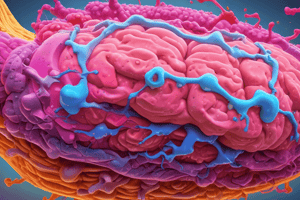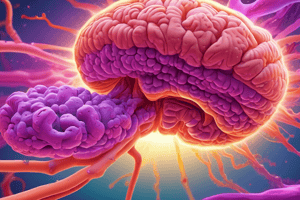Podcast
Questions and Answers
The pancreas contains only endocrine glands that produce hormones.
The pancreas contains only endocrine glands that produce hormones.
False (B)
The pancreas secretes 100 units of insulin daily.
The pancreas secretes 100 units of insulin daily.
False (B)
Glucagon is produced by beta cells in the pancreas.
Glucagon is produced by beta cells in the pancreas.
False (B)
Insulin helps control blood glucose levels by signaling the liver, muscle, and fat cells to release glucose from the blood.
Insulin helps control blood glucose levels by signaling the liver, muscle, and fat cells to release glucose from the blood.
The pancreas releases insulin only after eating.
The pancreas releases insulin only after eating.
Insulin is involved in the breakdown of fat in the body.
Insulin is involved in the breakdown of fat in the body.
Flashcards are hidden until you start studying
Study Notes
Pancreas Functions
- The pancreas contains exocrine glands that produce enzymes essential for digestion.
- The pancreas has an endocrine component, consisting of islet cells, which produce and release important hormones directly into the bloodstream.
Insulin and Glucagon
- Insulin is produced by beta cells in the pancreas.
- Glucagon is produced by alpha cells in the pancreas.
Insulin's Role in Blood Glucose Regulation
- Insulin helps regulate blood glucose levels by signaling the liver, muscle, and fat cells to take in glucose from the blood.
- Insulin enables cells to take in glucose for energy production.
- When the body has sufficient energy, insulin signals the liver to store glucose as glycogen.
Insulin Secretion
- The pancreas secretes 40-50 units of insulin daily in two stages.
- Basal insulin secretion occurs at low levels during fasting.
- Prandial insulin secretion occurs at increased levels after eating.
- An early burst of insulin occurs within 10 minutes of eating, followed by increasing release as long as hyperglycemia is present.
Diabetes and Insulin
- A lack of insulin, or an inability to adequately respond to insulin, can lead to the development of diabetes symptoms.
- Insulin is also involved in the storage of fat.
Studying That Suits You
Use AI to generate personalized quizzes and flashcards to suit your learning preferences.




